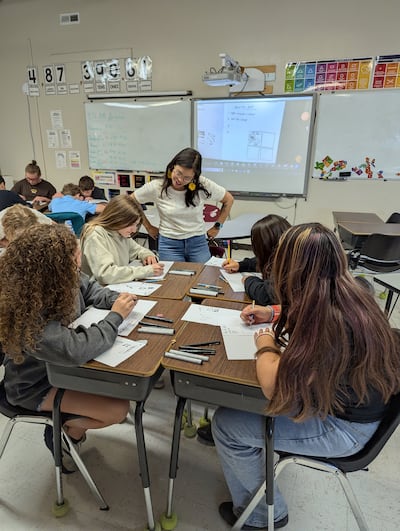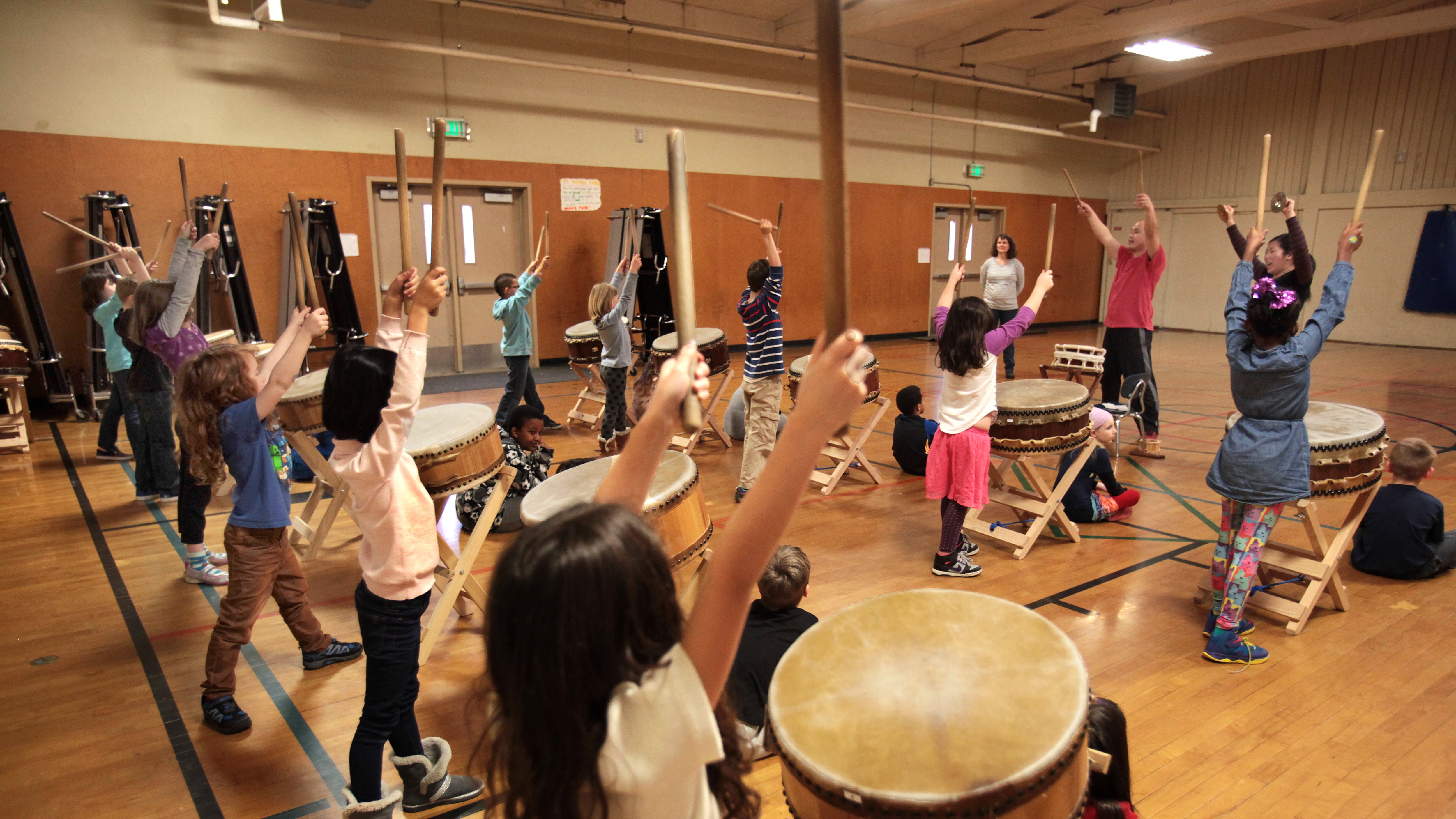Schools statewide might need to rethink how they schedule visiting artists to teach classes and perform in assemblies come fall.
A nonprofit that books performers and artists with teaching gigs in schools across Oregon and Southwest Washington is falling apart due to financial difficulties, and its executive director abruptly resigned last month, according to internal emails and interviews with multiple artists familiar with the situation.
As of June 6, Arts for Learning Northwest has paused in-school performances, workshops and residencies due to financial shortfalls. Two of its spinoff programs will proceed, in smaller capacities.
Costs for basic operations have increased while revenue and fundraising—through individual donors, foundations and grants—have all declined, according to a half-dozen emails sent over the course of six weeks and obtained by WW.
The final straw appeared in May, when the organization’s $40,000 National Endowment for the Arts grant was “held for review” (not terminated, however, like those of many other local arts organizations).
“This is one example of many, unfortunately, of previous funders and sources of support becoming unreliable as we look toward next year,” wrote Lauren Jost, then-executive director of ALNW, in a May 12 email to teaching artists.
Nine days later, Jost was out as executive director and an email signed by the ALNW board laid out a troubling sequence of events.
“For the past year, the budget was often described as tight but manageable by our executive director,” the June 6 email said, “and was communicated with a convincingly optimistic and ultimately inaccurate picture of the organization’s financial health. This belief was deeply rooted in the strength of our programming and partnerships, and in the hope that additional funding would come….
“The full severity of our financial challenges was acknowledged by our executive director very recently and [in] an emergency board meeting two weeks ago.”
Two of ALNW’s programs, the Right Brain Initiative and the Arts Care and Connection Project, will proceed. The Right Brain Initiative, which helps teachers incorporate art into their everyday curriculum, will operate in a smaller capacity, focused on its partnerships with Hillsboro and Gresham-Barlow schools, according to a June 23 email.
Nobody from the ALNW staff or board agreed to be interviewed for this story, but in a written statement, the board highlighted its two surviving programs:
“As we navigate a leadership transition and focus on financial planning, our summer programming will center on Arts, Care and Connection. This intentional pause in other activities will help strengthen our foundation as we prepare to relaunch our core Right Brain Initiative this fall—supporting students, schools and teaching artists with renewed energy and focus. Arts for Learning Northwest remains deeply committed to making arts and creativity accessible to all.”
ALNW, formerly known as Young Audiences of Oregon & SW Washington, maintains a roster of more than 70 artists who are available to perform or work with students in any of the 27 school districts across the region, including Portland Public Schools. The nonprofit has been the agent behind such arts education experiences for children as aerial performances, Ghanaian drumming, drama, mask-making, and ceramics. The organization has been around, in some form, since 1958 and currently serves about 50,000 students a year.
Generations of PPS children might recall participating in ALNW’s or Young Audiences’ “Run for the Arts” fundraiser. Once a core revenue stream for the organization, the fundraiser has “nearly dissolved” in the past five years due to decreased school participation, according to a June 6 email.
The organization’s 990 tax filings show a net loss of about $400,000 in the fiscal year ending in June 2023, on the heels of a net gain of $40,000 the year before.
Michelle Fujii, co-director of taiko drumming ensemble Unit Souzou, has been on the ALNW roster since 2005. Her contracts with ALNW represent at least half of her income. After that first disclosure of trouble in the May 12 email, the news kept getting worse. On May 21, the board of directors announced Jost had resigned. On June 1, Fujii and other teaching artists on the roster heard that their paychecks would be two weeks late. (The checks arrived only a couple of days late, according to the artists.) On June 6, the board announced the pause in programming to its roster.
It was a lot to take in so quickly.
“It was pretty shocking and unbelievable,” Fujii says. “It really felt like the board, who was making decisions, really felt like they could take advantage of teaching artists.”
Fujii and many of the artists on the roster are “1099ers,” she says, meaning independent contractors who rely on their ALNW contracts for a sizable chunk of their livelihoods. In return, ALNW takes a 30% cut from Fujii’s fees.
Without ALNW as an intermediary, artists are now on their own to figure out their own scheduling and contracts. Two hurdles to that: School is out for the summer and ALNW has not yet made its programming pause public.
Fujii, along with about eight other artists, have created an informal collective to try to support the roster through the tumult at ALNW. They sent a letter to the board on Friday, June 20, signed by 17 artists, demanding, in part, that ALNW go public about its funding shortfall so that teaching artists can start reaching out to schools in good faith.
Fujii is most concerned about the cultural artists who do not speak English as a first language and may struggle more to network with schools and write contracts for themselves. “It’s a process that can create a lot of barriers,” she says.
Jen Hernandez is a Corvallis illustrator who has been on the ALNW roster since 2022. She relies on ALNW for about 30% of her income, second only to Lane Arts Council, a similar organization in Eugene. She doesn’t expect to be able to forge her own relationships with Portland Public Schools, for example, because she doesn’t live in the city and schmoozing principals isn’t exactly her jam. She plans to pivot by opening a community art studio in Corvallis and teaching classes there.
Hernandez describes teaching illustration to students as a “constant joy and inspiration and gift.” She remains grateful for the opportunities she’s had through ALNW over the past three years, and empathetic to the funding challenges that arts nonprofits have faced in the past five.

“It’s so clear through the communications that the board and the people that work for Arts for Learning Northwest also care very deeply about this important work,” Hernandez says. “I think it’s important to stay on each other’s sides as much as possible.”
If ALNW doesn’t make it, Hernandez will miss the advocacy work the organization did on behalf of her profession.
“Without that advocacy, teachers and principals won’t recognize the value of what’s being offered to them and students will definitely miss out,” she says. “I think it’s going to be huge for students.”

